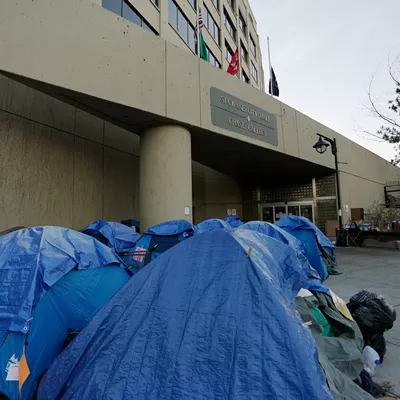You may remember the devil of 1991. It was a painting by a young homeless artist under the Washington Street train bridge, created as a part of a mural project sponsored by Crosswalk, the downtown center for homeless teenagers. Its mouth grimaced, rearing filed teeth; fingers and arms spread wide as if the demon was nailed to the cement wall, its sinewy skin gleaming red.
You only might remember it -- because it stood on Washington Street for just a few days. After that it was covered with white paint, criticized as too grotesque for the eyes of those who drove past it. But the demon still lives there. These days, it stands under a layer of painted handprints impressed upon the wall by homeless teenagers.
Denied other forms of protest, they wanted - at least in this simple, finger-painting kind of way, to voice their plea. That's because homeless teens share our city too - even with those of us who have homes. They may be a small and powerless subculture in Spokane, but they don't want the city to paint over them anymore.
Trevor's mother receives only $50 in food stamps each month. Sometimes there's food, but most of the time the cupboards are empty. Trevor and his mom had always fought, but about two months ago, their disagreements started to become more frequent. He says sometimes their fights became brawls. Trevor's mom told him that with so little money for food, he'd be better off on his own. So he left.
Trevor is 15.
Today he is spending the day, like most other days, at Crosswalk -- partly because he has little else to do, but mostly to avoid getting into fights.
"Crosswalk is sometimes safer than staying at home," he says. "There's more people here."
Fights are a big problem for him -- not because he starts them, but because people want to beat him up. Problem is, Trevor is small in stature. He tries to compensate by plastering a concrete expression on his face - which seems only to make people want to hurt him.
"You can't spank a kid and send them home," says Marilee Roloff, Crosswalk's executive director.
Even if it were an option, spankings are hardly something that would faze many of Spokane's street youth; most of them are living on the streets for reasons much worse then spankings.
Lonnie Keesee, director of Crosswalk, the only teen shelter of its kind in all of Eastern Washington, says that most kids who come through Crosswalk are coming from abusive homes. Some have parents who abused drugs and alcohol. Others had parents who were abused or homeless themselves. There are kids who were severely beaten, tortured or raped. Many have substance abuse or mental health issues. All are reasons teenagers will choose the streets over their own homes -- often they feel safer surviving on their own than living with family members who abuse or neglect them.
And all of them are between the ages of 11 and 18.
Keesee says that many Crosswalk kids have been asked to leave by biological parents who have been forced to choose between their spouses and their children.
"For a lot of parents, [asking the kids to leave] is to teach them a lesson or solve a problem," Keesee says. "Unfortunately, more times than [the parent] should, they say 'You need to leave' to their child."
And when those children are faced with the reality of living and surviving on the streets, they are forced to grow up quickly -- with no role models.
Keesee says that one thing commonly stands in the way of allowing these children to become productive, functioning members of society: a lack of functional adult relationships.
Last year, 74 percent of kids who came through Crosswalk's doors had a family conflict. Of these, nearly half had been thrown out of their homes; an equal number had been physically abused at home. Of their parents, one-third were abusing drugs and alcohol.
"Without Crosswalk, these kids would have not healthy adult relationships," says Keesee. "I see my job as keeping kids alive until they can do it themselves."
In his book Street Culture: An Epistemology of Street-Dependent Youth, Portland author Jerry Fest says that living on the streets is "a lifestyle that can be best characterized as endless hours of excruciating boredom, punctuated by moments of extreme terror."
Crosswalk, however, does see the occasional kid just looking for independence from their good homes. But rarely do those kids stay on the streets longer than a few nights -- that's usually how long it takes for them to get scared by the reality of life on the street.
Fest, now an independent trainer for street outreach and transitional agencies across the United States, says that the streets aren't attractive. In fact, it is the reality of the streets that usually distinguishes kids needing to get away from home from those just looking for independence.
"Runaways quickly seek services and are often terrified by their street experiences and are not accepted by street youth. They can be victimized and rejected," Fest says.
Holt, 18, has been out of the Spokane County jail for four hours, and he's already thinking about how he's going to make ends meet again. His home relationship has been rocky since he was 13 -- that was when he first slept out on the streets.
"Sometimes I'd leave, sometimes my mom would kick me out," he says.
He tried going back to his mother's house after he was released from jail earlier in the afternoon.
"Twenty minutes at my house and my mom kicked me out," he says.
He says that he was arrested a few days ago for residential burglary along with his 16-year-old girlfriend, Jerrica. They say they were just taking their stuff back from someone who stole it from them. Regardless, Holt says that he would rather be in jail than on the street.
"F--, it's better than being on the streets. You get bedding and food. Even the staff respects you."
Today he and his friends are hanging out on the lawn near the carousel at Riverfront Park. They are all struggling to find money and a place to sleep.
"Just because we hang out here and we've got Mohawks, we don't mean shit," he says. "No one wants to give us a chance. The look at us and they're like 'nah.'"
Misunderstood -- it's the claim of most every adolescent. But in the case of street-dependent youth, it couldn't be truer.
"The kid who is universally hated is the 18-year-old boy," Roloff says.
Roloff and Keesee agree that our culture is inherently afraid of teenagers -- an apprehension that only worsens the situations of Spokane's street teenagers.
Misunderstanding only deepens in trying to lasso the populations with figures. It is unclear just how many teenagers are truly street-dependent. Many bounce from couch to couch of friends and acquaintances; only a few can sleep in Crosswalk's overnight shelter. Crosswalk alone saw 1,100 kids last year walk through its doors.
Misconception even extends to the Spokane Police Department, which deals with the homeless teens when they get in trouble.
"Many homeless kids choose to be homeless," says Lt. Dean Sprague, the former administrative lieutenant for the now defunct School Resource Officers program. "I find it interesting during holidays that there are hardly any street kids, because they do happen to go back to their parents."
Sprague doesn't deny that some homeless teens are on the streets due to circumstances beyond their control, such as abuse or neglect. But like so many people, he regards many of them as deviants who can't or won't control their behavior: "As long as they don't have to follow the rules," he says, "they are just happy living at home. When they do have to follow the rules, they choose to be street kids. You've got to take all the fishhooks out of your face if you're going to sit down to Thanksgiving with Grandma. You don't have to worry about that when you're on the street."
But those who work with street kids say it's not always that simple. Following their parents' rules is not always a guarantee for kids to live safely in their own homes.
"A lot of people have this initial perception that if kids would just behave or obey their parents, there would be no Crosswalk," Keesee says.
He admits that he once had opinions similar to those of Sprague. But one day Keesee sat down with a young man at Crosswalk and asked why he didn't just go back to his parents' house. The boy replied that his mom's boyfriend had pulled a gun on him. The reality, in other words, is that some kids just can't go home -- rules or no rules.
Dorothy Balum, a 17-year volunteer at Crosswalk, says most of the kids' home situations are beyond the common conception of "bad." These homes include those in which kids have been victims of incest or cruelty.
"The sad part is some come from such tragic backgrounds that you wonder how they've made it this far," she says. "The whole idea of being homeless, not having food, not having medical care, is so foreign to us."
Once teens are on the streets, it's a day-to-day struggle to survive. Finding food is a constant job. Finding a job is practically impossible without some form of identification or parental consent. In 18-year-old street teenager Chris Whitley's case, his birth certificate is with his mother in Fairbanks, Alaska. He wishes he had grabbed it before his parents kicked him out. For Holt and Jerrica, their lives are on hold as they wait for sentencing on their burglary convictions. And in Trevor's case, he's simply too young to work.
But all of them maintain that being on the streets, or in jail, is better than being at home with their parents.
When Betty took her first drink at age 12, she probably wasn't thinking that one day she would be arrested for conspiring to deliver a controlled substance.
She first smoked pot in sixth grade. She snorted her first line of cocaine in 10th grade, and was using methamphetamines regularly by the time she finished high school. She's not sure how she graduated.
After high school, she officially left home. She came from a good home, but she'd always been able to lie to her single mother about her drug use. When her mother was married, her new stepfather saw through her lies. Betty didn't want to deal with his knowing what she was up to.
The next few years of her life were spent feeding her addiction. She and her friends would usually stay up for three or four nights using meth. During those days, they'd shoot it up to seven times a day.
She'd always told herself that she would never shoot drugs into her arms, but it was something she quickly compromised. She'd also promised herself never to prostitute for drugs.
"You sleep with the nasty drug dealers, and you say it's not prostituting," she says, wiping a tear from the corner of her eye. "When you're that age, you just can't look ahead."
After years of using, dealing and compromising her values to get high, Betty finally decided to get clean. She spent time in rehab and has never relapsed.
When she was two and a half years clean, she was arrested during a trip to the Tri-Cities. She was taken in on three-year-old charges of distributing drugs. Because of her years of being clean, she got off with community service hours.
She's 32 now, and after graduating from Eastern with a degree in social work, she has a job working with developmentally disabled citizens. She still attends drug-support meetings every week. The veins in her arms are still collapsed.
Survival is every street-dependent teenager's top priority. "[Surviving is] literally not dying. Legal and moral codes have no meaning," Fest writes in Street Culture. "All that matters to them when making choices is how they answer the following question: Does this action help me to not die?"
Unfortunately, truly surviving is not about finding need-based things like food, shelter or clothing. Those things can get teens through the day. The full-time job of street teenagers is figuring out how they're going to make it through to the next day in one piece. Every day is full of life-or-death choices.
Lynn Everson runs a program called Needle Exchange through the Spokane Regional Health District. It's a program in which she hands out clean, unused needles to intravenous drug users in hopes of curbing the spread of HIV and hepatitis. It's a way that she helps addicts survive their addictions in the least-damaging way possible.
She says that about 10 percent of the Needle Exchange clients are homeless teenagers.
Everson also spends a few nights a week taking a van out on East Sprague. Once there, she hands out clean needles, condoms, snacks and personal hygiene products to the prostitutes working there.
During those trips, Everson says 10 to 15 percent of the women they come across are teenagers.
Becoming a prostitute is one choice that some street-dependent youth will resort to in order to survive. In Betty's case, it was the way to feed her addiction -- something that she felt kept her alive.
For many teenagers who weren't runaways, like Betty, survival involves taking drugs. It's a way to numb the reality of living on the streets.
In her years of working with addicts, Everson says that she's met women who started drinking when they were only 7 years old.
"Why does a child who is 6 or 7 years old need to numb themselves with drugs or alcohol?" Everson wonders. "People don't become drug addicts because they are lazy. They do it because they need to numb. So when a child finds something to be OK or normal or better, it's an epiphany. They don't have to feel bad anymore. But once they find it, they spend the rest of their lives trying to get it."
"In the beginning, using drugs or alcohol to feel OK gives them some good moments. But the problem is, addiction creates its own problems."
Because so few are qualified or able to get jobs, most street-dependent teenagers make their money by panhandling. A less degrading task than prostituting or selling drugs, it's still a frustrating one. Many street teens find themselves getting into trouble for being too belligerent in their panhandling.
Lt. Sprague says that the police department only comes into contact with street youth when they are doing something wrong, like aggressively panhandling or breaking into a car.
"When they choose to not be law-abiding, it kind of closes the doors to sympathy," he admits. Sprague says that by giving money to panhandlers or those who hold cardboard signs on street corners, people are only encouraging the problem. He says people would be surprised by the amount of money that panhandlers make simply by asking others for money. It's an issue he says won't stop if people keep opening their wallets.
"People get what they subsidize," says Sprague "If you subsidize panhandlers, that's what you get. If it was just the begging, that's one thing. What comes with it is the littering, the lewdness and open urinations, the profanities, the threats and the other quality-of-life issues that come with vagrancy and living without responsibilities off the generosity of strangers. It all starts with the subsidizing."
"If you want a neighborhood full of stray cats," he adds, "pet one, and they'll come back."
Jerrica can't weigh more than 100 pounds. Although she's court-ordered to live with her aunt, right now she's hanging out at Riverfront Park with her friends. She really only stays with her aunt for a few nights each week.
"I got there -- 10 minutes out of jail -- and she asked when I was leaving," Jerrica recalls.
She sleeps with Holt on the street when she can't -- or won't -- stay at her aunt's house.
Jerrica says that since she doesn't live with her parents, she's run into lots of problems. When she was pregnant, for example, she tried going to a welfare office to get money.
"They said I couldn't get money because I didn't have structure. I was like, 'I've never had structure,'" she says.
Since she didn't have money, she says no doctor would help her.
"I didn't have a hospital that would take me. You know how you have to go in for your monthly appointments? Well, I guess I was underweight."
Jerrica miscarried the baby. She's 16 years old, without a job, and may soon face 30 days in a juvenile detention center. She isn't sure how she'll obtain dinner tonight, but she and Holt refuse to panhandle.
So she, Holt and their friends, who call themselves "the Gutter Punks," support each other -- helping each other find food, backing each other up in confrontations with other kids and finding places to sleep.
According to Fest, most street-dependent youth find peers who have been in similar situations. Those friends slowly turn into a supportive family -- one that is often far more supportive than the teenagers' biological family.
Street families often fulfill a void that most homeless teens have a hard time filling -- a sense of feeling needed. Many street youth who engage in prostitution or running drugs feel needed by their customers, especially regular ones. But in a situation like Jerrica's, not having a family with some monetary means proved deadly for her unborn child.
Jerrica's situation, however, is not an uncommon one on the streets. Everson says that unhealthy habits, such as physical and sexual abuse or drug abuse, are things that only get passed down to children through poor parenting skills.
"When [these kids] grow up in horrible homes, what are they learning?" she says.
Everson says that on many occasions she has had to show mothers how to touch and cuddle with their young children. Many times, parenting mothers are still children themselves.
"When a little kid is born, they're a clean slate," Everson says. "They are a journal that no one has written in."
In his book, Fest says that many abused street-dependent youth function on three different age levels. A homeless teenager may be chronologically 16 years old. But, on a level of experience, they deal with street life in such a way that gives them the experience of a 40-year-old. However, many of these same street-tough teenagers faced many years of abuse at home and were never parented correctly -- thus allowing them to behave and respond emotionally as a 6-year-old child might.
Everson says that when children are allowed to grow up in this fashion, society truly has betrayed them.
"We, as a society, have failed that child because we let them grow up in horrific places. And when they're not cute anymore, we blame them."
Dennis is sitting smoking a cigarette at the STA Plaza. His arms and lips shake uncontrollably. Before he says anything, he explains that he's only shaking because he just finished boxing at the YMCA, not because he's on drugs. Dennis is on his 25th day in detox. He's in for cocaine, crystal meth and "a whole bunch of pills."
The Spokane streets have been his home since he was 13 -- that's when his father kicked him out of the house. He's 18 now.
"My dad couldn't take care of me, and I didn't know where my mom was," he says. "He didn't like me anyway."
So from the day his father decided that he no longer cared for his son, Dennis has been forced to fend for himself. He says that most days he found places to sleep, but there were more than a few times that he slept outside.
Eventually he began dating a 28-year-old woman who made her money through dealing dope. She had a 12-year-old son.
Dennis lived with her and started using all the drugs he could get his hands on. But he finally realized that drugs were more important to his girlfriend than their relationship. So he gave up both her and the drugs, and checked himself into detox. He's happy with his decision, and he thinks that he's done pretty well on his own.
"It helped me to get stronger and look at things like an adult," Dennis says. "I know that if I had a perfect life the way it was supposed to be, I wouldn't have ever grown up."
It's hard to find kids like Dennis. But when Cup of Cool Water, a Christian ministry organization that reaches out to homeless teenagers, goes out on weeknight excursions, they quickly find lots of Dennises.
Cup of Cool Water is one of the many organizations in town trying to make some impression on curbing Spokane's homelessness issues. On weeknight outreaches, along with the occasional granola bar or sandwich, volunteers pass out informational cards with times when kids can do laundry. It's just their way of showing the kids that there are people willing to help them.
While they're sometimes thought of as marginal, these kids still need to eat like anyone else; places like Crosswalk help them to fill those basic needs. Churches and local volunteer groups provide daily meals for the kids. One woman treats the kids to cinnamon rolls on occasion. Crosswalk allots the kids a few items of clothing and a warm place to sleep at nights. Jerrica and Holt say it's the only place with a high school inside that still lets them take cigarette breaks during class. Sometimes the adult volunteers at Crosswalk are the first people who have let these kids be just that: kids. Roloff and Keesee say that sometimes the biggest, toughest kid who comes through Crosswalk is the one who will be glued to Saturday morning cartoons each weekend.
And in Everson's program, she helps show even the addicted that they are accepted in our city.
"We accept our clients where they are today, but we also want something better for them," she says.
It's organizations like these that are making a difference and attempting to break the vicious parent-child cycle that often spits these kids out onto the streets. Still, Everson points out, social services are no substitute for a healthy family environment. She says that putting boundaries on teen homelessness can begin to happen through parent education.
"We know what helps children grow up healthy, and yet much of it remains a mystery to so many parents," she says.
Everson, Keesee and Roloff all agree that the problem is a cultural one that requires a dramatic shift in attitude. Keesee says that sometimes when Crosswalk finally gets around to helping certain kids, they've already slipped too far through the cracks.
"The system is set up so adolescents are not the priority," he says. "There needs to be something in place that can reach these kids before we get to them."
Fest suggests that society must begin to focus on the abilities and potential of these kids, as opposed to solving their behaviors and problems.
"[We must] provide them with opportunities to develop as healthy human beings, instead of structures that attempt to 'correct' or 'fix' them," he says.
In Fest's opinion, solutions will happen only when our culture realizes that the socially acceptable path toward healthy living is readily available to everyone. Every homeless teen has a potential for being resourceful and useful in society. But until our culture stops painting over the problems, such resources will remain untapped -- and hundreds and hundreds of children will continue to be stuck on the street.
To learn more about Crosswalk, or to donate to it, call 838-6596 or check out www.voaspokane.org




















